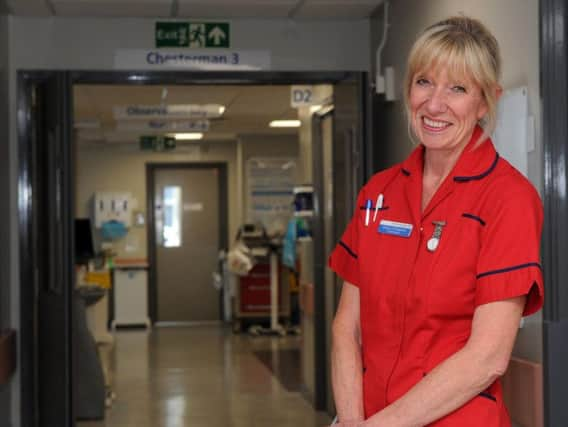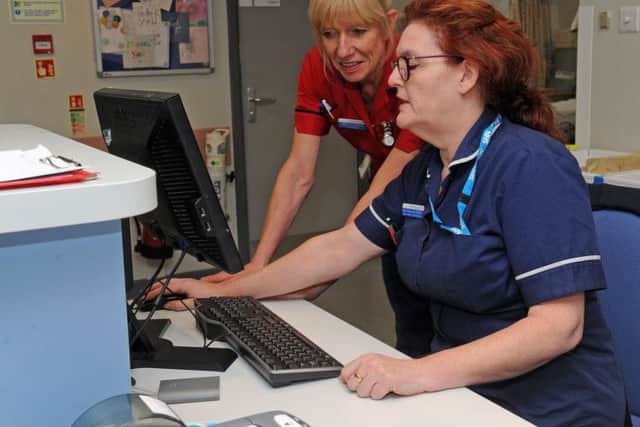Star Interview: 'Caring for people at their most vulnerable is the essence of the job': Sheffield's chief nurse Professor Dame Hilary Chapman on retirement and life in 'the best hospital in England'


But, at least once a month, the chief nurse at Sheffield Teaching Hospitals NHS Foundation Trust has gone back to basics, putting on her red uniform to join rank-and-file colleagues on an everyday clinical shift.
When we meet she’s working in the cardiothoracic unit at the Northern General, where she started her nursing career more than 30 years ago. A patient is ready to be discharged and she stops to talk, holding the woman’s hand and chatting in an easy manner.


Advertisement
Hide AdAdvertisement
Hide Ad“That lady came in on Monday, had major surgery and is going home on a Wednesday,” says Hilary a few minutes later. “You can’t believe it. When I started nursing that would have been at least a two-week stay, if not longer.”
Back then patients were expected to spend time on bed rest, slowly reintroduced onto a normal diet, and a physiotherapist might not reach them for days; now people are rehabilitated quickly instead of lingering in hospital, says Hilary. “That’s one of the fantastic things that’s changed. Length of stay has come down dramatically.”
Hilary retires tomorrow on her 55th birthday. Deciding to leave was tough, she says. “It’s really difficult. I’ve got mixed feelings about it. I know it’s the right time.”
She began her training as a student in 1982, qualifying three years later. She grew up in Deepcar – her father was director at the steelworks in Stocksbridge, and her mum taught French.
Advertisement
Hide AdAdvertisement
Hide Ad“I was supposed to be going to university to do business studies and French, and then I met somebody a year ahead of me in sixth form who was going to be a nurse,” says Hilary. “She gave me some old copies of Nursing Times and the Nursing Mirror. I read them and thought ‘I’d really like to do this’. I applied here, got in, started and I never looked back.”
Why did nursing hold such appeal?
“I probably didn’t know this at the time, but it’s that absolute privilege of being able to care for people when they’re at their most vulnerable. That’s the essence of nursing, for me. And you’re often caring for the family as well.”
Her first uniform, a dress with a silver belt buckle and a matching hat, was ‘very smart but a bit impractical’. “Some still choose to wear dresses but they’re much more forgiving now, you can stretch in them. Patients tell us it’s important to look smart.”
Initially a staff nurse in cardiothoracic surgery, she chose to spend much of her clinical career as a sister in intensive care. “Now, of course, I go anywhere I’m invited. I’ve worked everywhere, from looking after older people – which I love – to maternity, neurosurgery...”
Advertisement
Hide AdAdvertisement
Hide AdLater there were spells as chief nurse at Kettering General Hospital, and University Hospitals Coventry and Warwickshire, before she returned to take the top nursing job in Sheffield in 2006. “There’s something really special about being the chief nurse in your home city. I’ve worked all over the country, but when someone says ‘This lady’s from Fulwood’, you start to place the patient in their own setting. I’ve loved every job I’ve had, but 12 years ago this was the one I wanted.”
She’s a staunch advocate for nursing, and admits trying to convert others to the cause. “It’s a passport to anything you want to do. You can work in a hospital, in the community, in primary care with GPs, research, education, management. The really great thing is you can stay at the bedside from the day you register to the day you leave.”
In Hilary’s time the number of specialist nurses has increased from two to 750 in Sheffield. “Now, nurses can do practically anything. We can deliver the whole package of care. We have nurse consultants, consultant midwives, advanced nurse practitioners in neonatal, the emergency department – all over the hospital. You can progress far further now without leaving clinical practice.”
No one area is more important than another, she stresses. “Certain specialities get really high-profile media coverage because they’re on TV – Call The Midwife, Casualty.”
Advertisement
Hide AdAdvertisement
Hide AdAnd she accepts nurses are an element of a much bigger picture. Part of Hilary’s job has been to manage hotel services and estates, the physical infrastructure of a trust that employs nearly 17,000.
“It’s about every single person who works here. If one cog doesn’t turn, the machine doesn’t work as well as it should. I’m probably biased, but I think this is the best hospital in England.”
Alongside another chief nurse, Katherine Fenton, Hilary pioneered the Safer Nursing Care Tool, a way of calculating the right number of staff for a ward, based on the needs of patients rather than historic working practices. In Sheffield it has been used for 11 years.
“It enables me to assure everybody, including the public, that our wards are staffed appropriately,” she says. Professional judgement is still relied on too, she adds. “It’s not just the computer says ‘yes’, and you do that.”
Is it a struggle to meet the numbers the tool recommends?
Advertisement
Hide AdAdvertisement
Hide Ad“It isn’t at the moment. Needs have changed, but we always seem to have met them. But you can’t be blinkered.”
Patients are ‘sicker’ these days, Hilary says, but she is unsure whether legislating for safe staffing levels is the right thing to do. “They do it in California. I think it drives a particular way of working. If they did legislate, it needs to be thoughtful and there needs to be room for appropriate difference. If it’s a blunt instrument, it might not be the right outcome. It’s no use putting nurses onto wards where they’re not required.”
She wants the tool to be available, free, to every NHS hospital in England, and will be involved in the national roll-out following her retirement, having given up her intellectual property rights in the programme.
Hilary lives in Barnsley, and is married to Neil, a retired health service finance director. She was made a dame in the Queen’s New Year Honours in January, in addition to a CBE in 2012.
Advertisement
Hide AdAdvertisement
Hide AdShe is a visiting professor at Sheffield Hallam University, an honorary doctor of medicine at Sheffield University and became a deputy lord lieutenant of South Yorkshire last year.Chris Morley, her deputy who has been seconded to Rotherham for the past 12 months, will succeed her as chief nurse in Sheffield.
Last month Hilary was named as one of the NHS’s most influential nurses in a list to celebrate its 70th anniversary. She says her hard work – six-day weeks being a regular feature – has always been for the good of the service.
“The NHS is the finest institution in the world. Every one of us will need it at some point. I value it with every cell in my body. We don’t always get everything right all the time, but we’re full of staff who try their very best.”
'We want to keep our best nurses'
Sheffield has one of the highest retention rates in the NHS when it comes to nurses staying in the city – which helps in the search for future leaders like Professor Dame Hilary Chapman.
Advertisement
Hide AdAdvertisement
Hide Ad“We are lucky, but we work at it,” she says. “We try and be really flexible with shifts.”
People are not pressured to work full-time and the trust has 46 different shift patterns for nurses. “I worked with a staff nurse in intensive care who works one shift a week. If we can accommodate that, and you’re competent and up to date, which she is – fantastic.”
And while Hilary is a loyal employee, there are others who have been around even longer. “At my leaving do I looked round the room and there were people who were here when I was a student nurse.”